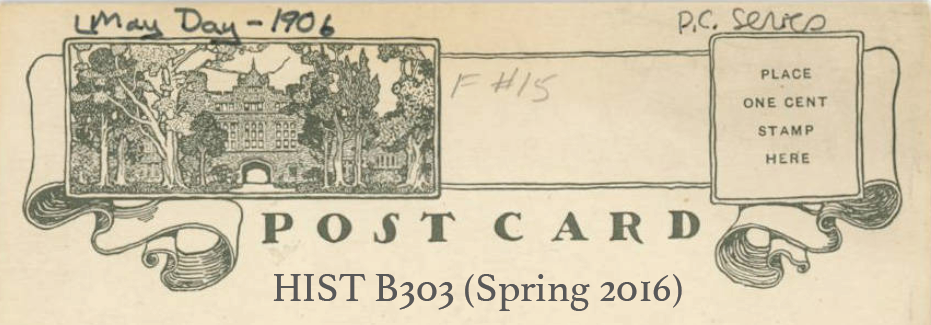Honestly, this week’s readings overwhelmed me. I think I was over-identifying with Jarrett Drake and also the archival efforts that Lae’l Hughes-Watkins write about because of my role as an editor of the college news. When Drake wrote, “You matter. Your experience matters. Your activism matters,” I had this weird moment where I realized that I wrote almost identical words, or expressed an extremely similar sentiment, in a couple of the letters from the editors last semester. It’s hard work to convince people that archives matter, it’s so emotional. It really is a lot of convincing people that they have important things to say and are valuable…which is really intense emotional labor.
It’s bizarre how much care-taking is involved with archiving, which Hughes-Watkins refers to when they talk about the challenges of the oral history project being gaining the interviewees’ trust. At the same time, it makes a lot of sense because you’re working with people’s stories, which in the end is all we have. It reminds me of this anthology of Latina narratives called Telling to Live–here’s the summary of the novel from the Amazon page (hehe):
Telling to Live embodies the vision that compelled Latina feminists to engage their differences and find common ground. Its contributors reflect varied class, religious, ethnic, racial, linguistic, sexual, and national backgrounds. Yet in one way or another they are all professional producers of testimonios—or life stories—whether as poets, oral historians, literary scholars, ethnographers, or psychologists. Through coalitional politics, these women have forged feminist political stances about generating knowledge through experience. Reclaiming testimonio as a tool for understanding the complexities of Latina identity, they compare how each made the journey to become credentialed creative thinkers and writers. Telling to Live unleashes the clarifying power of sharing these stories.
The complex and rich tapestry of narratives that comprises this book introduces us to an intergenerational group of Latina women who negotiate their place in U.S. society at the cusp of the twenty-first century. These are the stories of women who struggled to reach the echelons of higher education, often against great odds, and constructed relationships of sustenance and creativity along the way. The stories, poetry, memoirs, and reflections of this diverse group of Puerto Rican, Chicana, Native American, Mexican, Cuban, Dominican, Sephardic, mixed-heritage, and Central American women provide new perspectives on feminist theorizing, perspectives located in the borderlands of Latino cultures.
This often heart wrenching, sometimes playful, yet always insightful collection will interest those who wish to understand the challenges U.S. society poses for women of complex cultural heritages who strive to carve out their own spaces in the ivory tower.
I included this because I think this book says something about trust, ownership, and storytelling. This book is complicated because I wonder if the Latina’s who offer their stories would feel comfortable participating in an oral history project, for example. It seems to me that they chose to create an anthology because they needed a separate space–which makes sense to me. It’s frustrating because as a Latina I completely understand not trusting institutions (archives or even a newspaper like the college news) with the stories of marginalized groups. I guess I’m just so overwhelmed because if I want to be someone who works in academia and academic institutions, it hurts me to know that I can’t be my community’s safe space. No matter what I do, it feels like the harmful history of the spaces I choose to be in will alienate me from the communities that I say I’m working to heal.

Really liked this line- “No matter what I do, it feels like the harmful history of the spaces I choose to be in will alienate me from the communities that I say I’m working to heal”